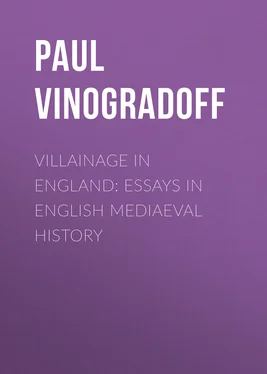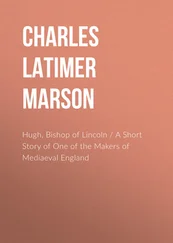Paul Vinogradoff - Villainage in England - Essays in English Mediaeval History
Здесь есть возможность читать онлайн «Paul Vinogradoff - Villainage in England - Essays in English Mediaeval History» — ознакомительный отрывок электронной книги совершенно бесплатно, а после прочтения отрывка купить полную версию. В некоторых случаях можно слушать аудио, скачать через торрент в формате fb2 и присутствует краткое содержание. Жанр: foreign_prose, Юриспруденция, История, foreign_edu, foreign_antique, на английском языке. Описание произведения, (предисловие) а так же отзывы посетителей доступны на портале библиотеки ЛибКат.
- Название:Villainage in England: Essays in English Mediaeval History
- Автор:
- Жанр:
- Год:неизвестен
- ISBN:нет данных
- Рейтинг книги:4 / 5. Голосов: 1
-
Избранное:Добавить в избранное
- Отзывы:
-
Ваша оценка:
- 80
- 1
- 2
- 3
- 4
- 5
Villainage in England: Essays in English Mediaeval History: краткое содержание, описание и аннотация
Предлагаем к чтению аннотацию, описание, краткое содержание или предисловие (зависит от того, что написал сам автор книги «Villainage in England: Essays in English Mediaeval History»). Если вы не нашли необходимую информацию о книге — напишите в комментариях, мы постараемся отыскать её.
Villainage in England: Essays in English Mediaeval History — читать онлайн ознакомительный отрывок
Ниже представлен текст книги, разбитый по страницам. Система сохранения места последней прочитанной страницы, позволяет с удобством читать онлайн бесплатно книгу «Villainage in England: Essays in English Mediaeval History», без необходимости каждый раз заново искать на чём Вы остановились. Поставьте закладку, и сможете в любой момент перейти на страницу, на которой закончили чтение.
Интервал:
Закладка:
Prescription.
There are two other ways of becoming a villain besides being born to the condition; the acknowledgment of unfree status in a court of record, and prescription. We need not speak of the first, as it does not present any particulars of interest from a historical point of view. As to prescription, there is a very characteristic vacillation in our sources. In pleadings of Edward III's time its possibility is admitted, and it is pointed out, that it is a good plea if the person claimed by prescription shows that his father and grandfather 68 68 Fitzherbert, Vill. 24 (H. 50 Edw. III; P. 40 Edw. III, 17): 'Si home demurt en terre tenue en villenage de temps dount, etc., il sera villen, et est bon prescripcion et encountre tel prescripcion est bon ple a dire qe son pere ou ayle fuit adventiffe,' etc. I suppose ayle here to be a simple error for ayl or ael , grandfather.
were strangers.
There is a curious explanatory gloss, in a Cambridge MS. of Bracton, which seems to go back at least to the beginning of the fourteenth century, and it maintains that free stock doing villain service lapses into villainage in the fifth generation only 69 69 Cambridge Univ., Dd. vij. 6, f. 231: 'Nota de tempore quo servus dicere poterit quia fecerit consuetudines villanas racione tenementi non racione persone. Et sciendum, quod quamdiu servus poterit verificare stipitem suam liberam non dicitur nativus, set quam citius dominus dicere poterit villicus noster est ex auo et tritauo, tunc primo desinit gaudere replicacione omnimoda et privilegio libertatis racione stipitis, ut si A. primo ingressus villenagium tenuerit de F. per villana servitia, deinde B. filius A., deinde C. filius B., deinde D. filius C., et sic tenuerint in villenagium de gradu in gradum usque ad quartum gradum de F. et heredibus suis, ille uillanus inuentus in quinto gradu descendente natiuus dicitur.' I am indebted for this passage to the kindness of Prof. Maitland.
. On the other hand, Britton flatly denies the possibility of such a thing; according to him no length of time can render free men villains or make villains free men. Moreover he gives a supposed case (possibly based on an actual trial), in which a person claimed as a villain is made to go back to the sixth generation to establish his freedom. 70 70 Britton, i. 196, 206.
It does not seem likely that people could often vindicate their freedom by such elaborate argument, but the legal assumption expounded in Britton deserves full attention. It is only a consequence of the general view, that neither the holding nor the services ought to have any influence on the status of a man, and in so far it seems legally correct. But it is easy to see how difficult it must have been to keep up these nice distinctions in practice, how difficult for those who for generations had been placed in the same material position with serfs to maintain personal freedom. 71 71 Hale, Pleas of the Crown (ed. 1736), ii. 298, gives an interesting record from Edward I's reign, which shows that even the general theory was doubtful.
For both views, though absolutely opposed to each other, are in a sense equally true: the one giving the logical development of a fundamental rule of the law, the other testifying to the facts. And so we have one more general observation to make as to the legal aspect of villainage. Even in the definition of its fundamental principles we see notable discrepancies and vacillations, which are the result of the conflict between logical requirements and fluctuating facts.
Criminal law in its relation to villainage.
The original unity of purpose and firmness of distinction are even more broken up when we look at the criminal and the police law where they touch villainage. In the criminal law of the feudal epoch there is hardly any distinction between free men and villains. In point of amercements there is the well-known difference as to the 'contenement' of a free landholder, a merchant and a villain, but this difference is prompted not by privilege but by the diversity of occupations. The Dialogus de Scaccario shows that villains being reputed English are in a lower position than free men as regards the presumption of Englishry and the payment of the murder-fine, 72 72 Dial. de Scacc. i. 10. p. 193: 'Ea propter pene quicumque sic hodie occisus reperitur, ut murdrum punitur, exceptis his quibus certa sunt ut diximus servilis condicionis indicia.' On the other hand the Dialogus lays stress on the fact, that if a villain's chattels get confiscated they go to the king and not to the lord (ii. 10. p. 222), but this is regarded as a breach of a general principle.
but this feature seems to have become obliterated in the thirteenth century. In some cases corporal punishment may have differed according to the rank of the culprit, and the formalities of ordeal were certainly different 73 73 Glanville, xiv. 1: 'Per ferrum callidum si fuerit homo liber, per aquam si fuerit rusticus.'
. The main fact remains, that both villains and free men were alike able to prosecute anybody by way of 'appeal' 74 74 Lighter offences committed by the lord could not give rise to prosecution, but the persona standi in iudicio was admitted in a general way even in this case. A curious illustration of the different footing of villains in civil and criminal cases is afforded by a trial of Richard I's time. Richard of Waure brings an appeal against his man and reeve, Robert Thistleful, for conspiring with his enemies against his person. He offers to prove it against him, 'ut dominus, vel ut homo maimatus, sicut curia consideraverit.' Reeves were mostly villains, and the duty of serving as a reeve was considered as a characteristic of base condition. The lord probably goes to the King's court because he wants his man subjected to more severe punishment than he could inflict on him by his own power. (Rot. Cur. Regis Ricardi, 60.)
for injury to their life, honour, and even property 75 75 The lord had power over their property, but against everybody else they were protected by the criminal law.
, and equally liable to be punished and prosecuted for offences of any kind. Their equal right was completely recognized by the criminal law, and as a natural sequence of this, the pleas of the crown generally omit to take any notice of the status of parties connected with them. One may read through Mr. Maitland's collection of Pleas of the Crown edited for the Selden Society, or through his book of Gloucestershire pleas, without coming across any but exceptional and quite accidental mentions of villainage. In fact were we to form our view of the condition of England exclusively on the material afforded by such documents, we might well believe that the whole class was all but an extinct one. One glance at Assize Rolls or at Cartularies would teach us better. Still the silence of the Corona Rolls is most eloquent. It shows convincingly that the distinction hardly influenced criminal law at all.
Police in relation to villainage.
It is curious that, as regards police, villains are grouped under an institution which, even by its name, according to the then accepted etymology, was essentially a free institution. The system of frank pledge ( plegium liberale ), which should have included every one 'worthy of his were and his wite ,' is, as a matter of fact, a system which all through the feudal period is chiefly composed of villains 76 76 Sometimes the system is used so as to enforce servitude. See Court Rolls of Ramsey Abbey. Augmentation Court Rolls, Edw. I, Portf. 34, No. 46, m. 1 d. (Aylington): 'Adhuc dicunt quod Johannes filius Ricardi Dunning est tannator et manet apud Heyham, set dat per annum pro recognicione duos capones. Et quia potens est et habet multa bona, preceptum fuit Hugoni Achard et eius decennae ad ultimum visum ad habendum ipsum ad istam curiam, et non habuit. Ideo ipse et decenna sua in misericordia.' (This case is now being printed in Selden Soc. vol. ii. p. 64.)
. Free men possessed of land are not obliged to join the tithing because they are amenable to law which has a direct hold on their land 77 77 Bracton, 124 b: 'Quia omnis homo siue liber siue seruus, aut est aut debet esse in franco plegio aut de alicuius manupastu, nisi sit aliquis itinerans de loco in locum, qui non plus se teneat ad unum quam ad alium, vel quid habeat quod sufficiat pro franco plegio, sicut dignitatem vel ordinem vel liberum tenementum, vel in civitatem rem immobilem.' Nichols, Britton, i. 181, gives a note from Cambr. MS. Dd. vii. 6, to the effect that 'Villeins and naifs ought not to be in tithings, secundum quosdam.' This is certainly a misunderstanding, but it can hardly be accounted for either by the enfranchisement of the peasant or the decay of the frank-pledge. I think the annotator may have seen the passages in Leg. Cnuti or Leg. Henrici I, which speak about free men joining the tithings, or speculated about the meaning of 'plegium liberale.' There could be no thought of excluding the villains in practice during the feudal period. As to the allusion in the Mirror of Justices, I shall refer to it in Appendix III.
, and so the great mass of free men appear to be outside these arrangements, for the police representation of the free, or, putting it the other way, feudal serfs actually seem to represent the bulk of free society. The thirteenth-century arrangements do not afford a clue to such paradoxes, and one has to look for explanation to the history of the classes.
Интервал:
Закладка:
Похожие книги на «Villainage in England: Essays in English Mediaeval History»
Представляем Вашему вниманию похожие книги на «Villainage in England: Essays in English Mediaeval History» списком для выбора. Мы отобрали схожую по названию и смыслу литературу в надежде предоставить читателям больше вариантов отыскать новые, интересные, ещё непрочитанные произведения.
Обсуждение, отзывы о книге «Villainage in England: Essays in English Mediaeval History» и просто собственные мнения читателей. Оставьте ваши комментарии, напишите, что Вы думаете о произведении, его смысле или главных героях. Укажите что конкретно понравилось, а что нет, и почему Вы так считаете.












